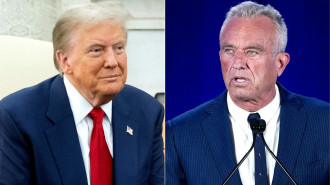Israel 'open' to talks with Lebanon over disputed sea border
Israel has said it is open to US-mediated negotiations with Lebanon to resolve an ongoing dispute over the countries' maritime border.
The dispute involves an area of around 860 square kilometres (330 square miles) at the edge of three of Lebanon's southern energy blocks and has threatened oil and gas exploration in the Mediterranean.
Opening talks to agree upon a border could be "for the good of both countries' interests in developing natural gas reserves and oil", Israeli Energy Minister Yuval Steinitz said on Monday after a meeting with US envoy David Satterfield, according to Reuters.
Israel claims waters in one of those energy blocks, block 9.
Lebanon's southern neighbour, with which it is still technically at war, began a scramble for gas exploration in the eastern Mediterranean around a decade ago when it discovered two massive gas fields.
But exploration in the area has been hampered by a number of diplomatic conflicts, with political relations between numerous states in the region, including Cyprus, Turkey, Greece, Egypt, Israel and Lebanon, strained.
Neither Lebanon nor the US has made an official comment yet on Steinitz’s comments.
US State Department's acting assistant secretary for Near Eastern affairs Satterfield reportedly told officials in Lebanon that Israel had agreed to mediated negotiations over the maritime border last week.
Both Israel and Lebanon have repeatedly warned about encroachment, with each side promising to protect its territory and resources.
Israeli Defense Minister Avigdor Lieberman has described Lebanon's offshore oil and gas exploration tender as "very provocative" and suggested that Lebanon had last year put out a tender to international groups for a gas field "which is by all accounts" Israeli.
A consortium composed of energy giants Total, ENI and Novatek was awarded two of Lebanon's 10 exploration blocks last year.
It is set to start drilling in block 4 in December, and later in the disputed block 9.
On April 5, Lebanon invited international consortia to bid for five more blocks, which include two also adjacent to Israel's waters.







 Follow the Middle East's top stories in English at The New Arab on Google News
Follow the Middle East's top stories in English at The New Arab on Google News

![The meeting between Musk and Iravani was 'positive', Iranian sources said [Getty]](/sites/default/files/styles/image_330x185/public/2024-11/GettyImages-2184077711.jpg?h=f5c1ac2a&itok=Wb2mIhsF)
![Dutch politicians have used harsh rhetoric against the country's Muslims following Israeli-instigated violence [Getty]](/sites/default/files/styles/image_330x185/public/2024-11/GettyImages-2184046796.jpg?h=199d8c1f&itok=3kSTEWRC)